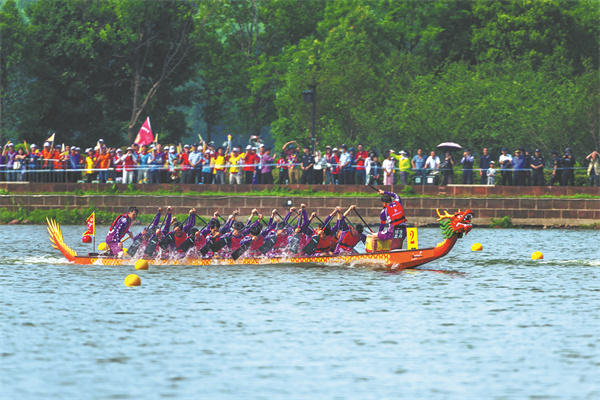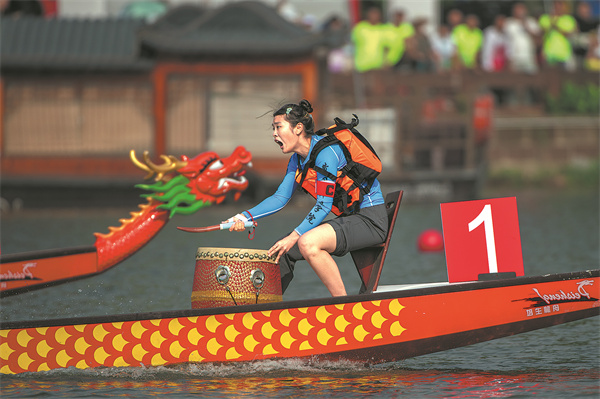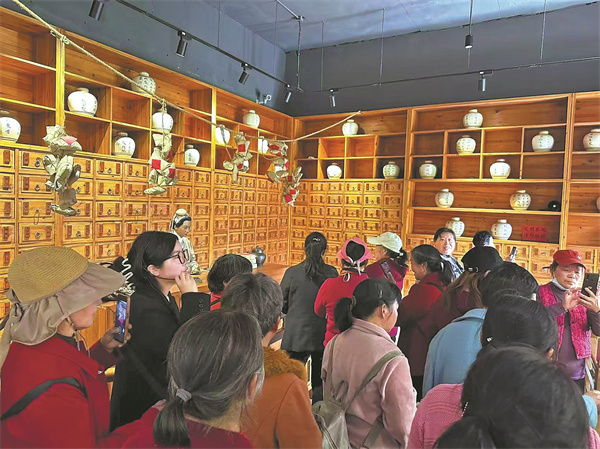
Rowers compete in thrilling dragon boat races during the 2025 National Dragon Boat Carnival and the 2025 Hubei Provincial Dragon Boat Open, which took place at Yi'ai Lake Park in Huanggang, Hubei Province. The event kicked off on May 24 and lasted for two days.[Photo provided to China Daily]
When 70-year-old Cheng Guizhi hung the first bundle of mugwort herbs above her weathered door-frame at dawn, a dozen livestreaming phones captured the ritual from multiple angles.
As the sun rose over the Dabie Mountains' terraced fields, these images would reach urban viewers hundreds of kilometers away in Wuhan, Hubei province — where a tech worker paused over her coffee to take a screenshot of the scene, later using it as her phone's wallpaper.
This exchange epitomizes rural Hubei's attempts at cultural rejuvenation. Once-fading ancient Chu traditions, resurrected through Dragon Boat Festival tourism, have driven a surge in village participation in recent years.
From AI-monitored dragon boats to the food delicacy zongzi, the traditional festival in Qichun county, which started on May 24 and lasted for two days, has become the crucible for China's rural-urban reconnection.
In Zhulin township's mist-shrouded valleys, the making of fennel zongzi, the sticky rice dumplings synonymous with the festival, unfolds with great precision.
"Every leaf comes from slopes above 400 meters — where the air thins and flavors concentrate," explains Wu Fengsheng, Party secretary of the township, as he watches workers layer free-range pork with the herbs.
The township's cooperative, a gathering of local women and food scientists, produces zongzi every year to meet demand in nearby townships. Each triangular parcel carries a bar code attached to the wrapping that when scanned reveals the exact terraced plot where the fennel was grown.

Rowers compete in thrilling dragon boat races during the 2025 National Dragon Boat Carnival and the 2025 Hubei Provincial Dragon Boat Open, which took place at Yi'ai Lake Park in Huanggang, Hubei Province. The event kicked off on May 24 and lasted for two days.[Photo provided to China Daily]
This traceability of the ingredient serves two purposes. For buyers, it certifies the provenience of the zongzi, and for villagers, it helps explain the ancestral knowledge behind the delicacy.
"My grandmother measured ingredients by fistfuls," said Zhou Aihua, her hands instinctively forming a measuring cup shape. "Now machines weigh ingredients to the gram — but the memory of what they should taste like stays with us."
The workshop's industrial steamers coexist with bamboo baskets dating to the 1920s, their patina preserved under glass displays.
Through collaborations with Wuhan's Huazhong Agricultural University, the township has developed a "heritage genome" database cataloging local ingredients.
"Soon, tourists can scan zongzi wrappers to watch the pork's production story," said Liu Lu, general manager of the Hubei Nonghe Culture and Tourism Development Co.
Hubei is known as "China's sweet persimmon capital", and the development company also serves desserts blending black goat cheese from Dabie Mountains with persimmon jam.
"Every bite contains centuries," Liu said, referencing 600-year-old persimmon trees.

Visitors check into wooden cabins at scenic spots around the Dabie Mountains in May.[Photo provided to China Daily]
Rituals revived
Several kilometers away, at the Lishizhen Intangible Cultural Heritage Museum, augmented reality transforms visitors into virtual apprentices of moxibustion therapy.
"During the Dragon Boat Festival period, our cultural center is hosting a series of training sessions in music, dance, fine arts, calligraphy, body shaping, and modeling," museum curator Zhang Hongquan said.
"We also organized a cultural performance week for service promotion, featuring around 10 folk programs related to the festival, including traditional song and dance performances."
The museum has set up an Intangible Cultural Heritage Market and will host the Li Shizhen Traditional Chinese Medicine Culture Festival on June 26 and 27, featuring live demonstrations of moxibustion therapy, Zhang said.
To further enhance visitor engagement with the local culture, the museum has designed two special tour routes.
The first route begins at the memorial hall, where visitors can listen to narrations of the life story of Li Shizhen, the renowned 16th century pharmacologist, and explore exhibits showcasing traditional Chinese medicine culture documented in Li's Compendium of Materia Medica.
During the Dragon Boat Festival period, the itinerary extends to a specially curated Li Shizhen Cultural Tourism Zone, where guests can sample "medicinal cuisine" prepared according to seasonal health principles, Zhang said. At the Li Shizhen Herbal Wine Workshop tour participants can observe historical fermentation techniques in authentic cellars and taste artisanal medicinal liquors.
"Complementing this experience, the second route includes a visit to our handmade moxa stick production base," Zhang said. "Here, visitors actively participate in crafting moxibustion sticks using methods preserved for over five centuries, and guided by certified inheritors of this national intangible cultural heritage."
The cultural immersion culminates at the Qichun Moxibustion Demonstration Center, where master practitioners demonstrate certified therapeutic techniques while explaining their scientific foundations in Chinese medicine, he added.
Hu Yaojie, curator of the Li Shizhen Memorial Museum in Huanggang, Hubei, said: "Hanging mugwort in homes is a traditional custom observed by every household in our region during the Dragon Boat Festival. This year, the museum has specially set up a hands-on workshop where visitors can craft delicate sachets themselves.
"Additionally, the museum launched online livestreaming activities to share the festive atmosphere with virtual audiences. Viewers cannot only experience the unique charm of Dragon Boat Festival traditions in real time but also purchase themed cultural products with a click," he said.

The Li Shizhen Memorial Museum in Huanggang, Hubei, is adorned with mugwort bouquets to celebrate Dragon Boat Festival.[Photo provided to China Daily]
Up a livestream
At the Yiai Lake's dragon boat arena in Huanggang, before the official start of the festival, thousands of spectators cheer as an AI "conductor" gives instructions to rowers on how to coordinate the movement of the paddles. Real-time data is projected onto large screens.
For 54-year-old dragon boat captain Zhao Decheng, technology is now an accepted part of his cherished festival traditions.
"My grandfather said true power comes from the heart," he said pointing to himself, "not just arms".
His crew's prerace ritual remains unaltered, offering steamed zongzi to a carved dragon head dating from the Qing Dynasty (1644-1911). However, their mascot now has a discreet QR code attached that links to an introduction about its history and a craftsmanship certificate.
The county's Culture and Tourism Director Hu Xiaoyan said the monitoring of spikes in hotel occupancy rates correlates with excitement surrounding race heats. Each dragon boat drumbeat translates to economic momentum. "This isn't just sport," she said of the income the races help generate.
For the festival, they have organized citywide cultural and tourism activities, focusing on four key areas: discounted scenic spot admissions, high-quality event competitions, diverse cultural programming, and promotional campaigns to drive visitor engagement.
The intersection of the traditional and modern can be seen throughout the township.

Tourists flock to the museum ahead of the festival to participate in traditional Chinese medicine workshops.[Photo provided to China Daily]
As fireworks dissolve into starry skies in the township of Zhulin, negotiations between different generations unfold beneath ancient ginkgo trees. Elderly villagers chant Duanwu ballads in a dialect that used to be a part of the Chu culture, their voices ringing to smartphone recordings. Tech entrepreneurs from Wuhan barter with weavers for digital rights to cattail knot patterns, while teenagers teach octogenarians how to use heritage-filter apps.
"Tradition used to mean repetition," said cultural scholar, Professor Gao Bingzhong of Peking University. "Now, it's a live-editing process — villagers curate memories for urban consumption, while city dwellers seek roots through VR (virtual reality) ancestral temples."
This mutual reinvention bears tangible results, as almost half of Qichun's youth now choose local tourism jobs over migrant work, a reversal from five years ago.
Economist Xu Linchuan from the London School of Economics and Political Science, observing the scene, identified a paradigm shift. "Heritage has become transactional memory," Xu said. "Urbanites purchase nostalgia calibrated to their childhoods — whether that's 1990s Wuhan or 1970s Hubei."
Back in Cheng Guizhi's courtyard, the matriarch inspects her granddaughter's latest TikTok video — a splitscreen juxtaposing her mugwort hanging with a digital art installation in Wuhan's Optics Valley. "They turned my knots into neon!" she chuckles, unaware the clip has just been acquired by several hundred netizens.
 Editor:Qiu Xiaochen
Editor:Qiu Xiaochen